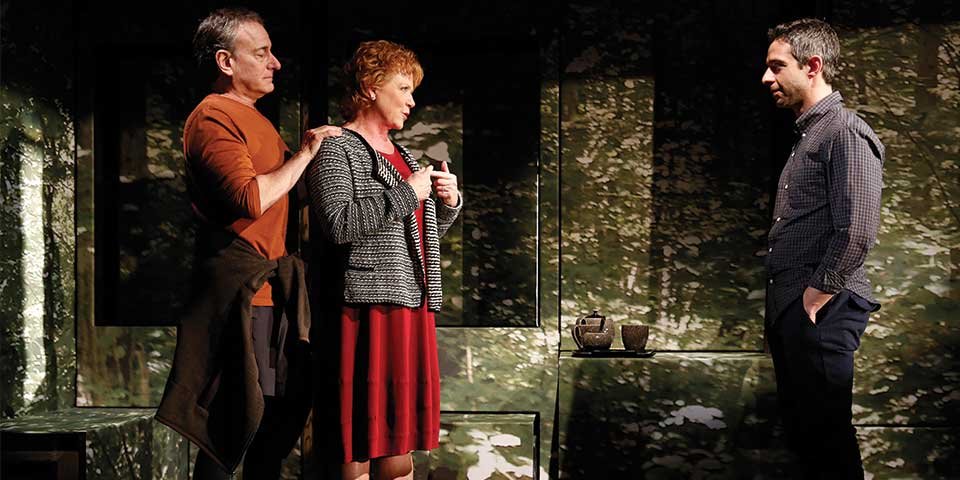“For those baby boomers who grew up watching Warner Bros. cartoons on television every Saturday morning, the inexorable demise of Bugs and his friends has been a source of nostalgic dismay. But for critics and scholars who believe that the best studio-era animated cartoons are comparable in quality to the best live-action screen comedies of the 1930s and 40s, it is a catastrophe…”
Archives for December 21, 2012
TT: Further up the road
In today’s Wall Street Journal drama column I review the off-Broadway premiere of Amy Herzog’s The Great God Pan and a Boston remounting of David Cromer’s production of Our Town. Here’s an excerpt.
* * *
Few things in theater are more exciting than watching a talented young artist come into her own. That’s what has been happening to Amy Herzog. In “After the Revolution,” the story of a family of red-diaper leftists, and “4000 Miles,” its sequel, Ms. Herzog showed herself to be possessed of a rare gift: the ability to write witty, incisive studies of people in whom the personal has collided with the political to potentially devastating effect. What is most striking about those two plays is that they are informed by ideology without being driven by it: Their tone is as light as their subject matter is dark. Much the same can be said of “The Great God Pan,” Ms. Herzog’s new play, which is not as effective as its predecessors but still leaves no doubt of her gifts.
 “The Great God Pan” is “about” recovered memory in the same way that “After the Revolution” and “4000 Miles” are “about” Communism: Its nominal subject is a pretext for the exploration of the personalities of its characters. Jamie (Jeremy Strong), the protagonist of “The Great God Pan,” is a pleasant but emotionally inhibited young journalist whose glassy surface is shattered when he discovers more or less simultaneously that (A) he may have been molested as a child and (B) Paige (Sarah Goldberg), his longtime girlfriend, is pregnant….
“The Great God Pan” is “about” recovered memory in the same way that “After the Revolution” and “4000 Miles” are “about” Communism: Its nominal subject is a pretext for the exploration of the personalities of its characters. Jamie (Jeremy Strong), the protagonist of “The Great God Pan,” is a pleasant but emotionally inhibited young journalist whose glassy surface is shattered when he discovers more or less simultaneously that (A) he may have been molested as a child and (B) Paige (Sarah Goldberg), his longtime girlfriend, is pregnant….
It’s a worthy premise, but Ms. Herzog doesn’t quite manage to bring it off. Not only does “The Great God Pan” lack suppleness–the plot feels schematic–but the play’s principal characters are drawn so closely to their new-class type as to suggest a satirical intent that is at odds with the play’s emotional weight….
David Cromer’s universally acclaimed production of “Our Town” originated in Chicago in 2008, ran for more than 600 performances Off Broadway, then transferred successfully to Los Angeles. Now it has been remounted by Boston’s Huntington Theatre Company, with Mr. Cromer repeating his coolly ironic performance as the Stage Manager. I caught it in New York and was stunned–no lesser word is strong enough–by the potency with which Mr. Cromer re-envisioned Thornton Wilder’s 1938 masterpiece about life in a small New Hampshire town, dressing his cast in street clothes and encouraging them to act with casual, desentimentalizing directness. You can’t help but wonder whether so overwhelming a show can stand up to repeat viewings, so I decided to drive up to Boston and see for myself. The answer is decidedly in the affirmative….
* * *
Read the whole thing here.
A trailer for The Great God Pan:
TT: Everything old is new again
My “Sightings” column in today’s Journal is devoted to Recomposed by Max Richter, an avant-garde rewrite of Vivaldi’s Four Seasons. Here’s an excerpt.
* * *
Brace yourselves, music lovers: Antonio Vivaldi’s “Four Seasons” has come to Greenwich Village. (Le) Poisson Rouge, an ultra-trendy nightspot (superfluous parentheses in the original) which bills itself as a “multimedia art cabaret” that seeks to “revive the symbiotic relationship between art and revelry,” booked a two-night run of classical music’s most overplayed masterpiece.
Why? Because “The Four Seasons” has been refurbished by Max Richter, an avant-garde composer of minimalist inclination, and recorded for Deutsche Grammophon by violinist Daniel Hope, who played it earlier this week at (Le) Poisson Rouge. And before you bruise your eyeballs by rolling them, here’s the real surprise: “Recomposed by Max Richter,” as Mr. Hope’s new CD is called, is a bewitchingly brilliant musical hybrid that manages against all odds to breathe life into an exhausted warhorse that a great many listeners–myself included–long ago ceased to find listenable.
Here’s how Mr. Richter explains what he did to “The Four Seasons”: “In my notes you will find parts that consist of 90% of my own material; but on the other hand you will find moments where I have only altered a couple of notes in Vivaldi’s original score and shortened, prolonged or shifted some of the beats. I literally wrote myself into Vivaldi’s score.” That bald description, however, does nothing to suggest the arresting freshness with which Mr. Richter has taken the repetitive patterns of “The Four Seasons” and passed them through the twin refracting prisms of post-minimalist classical composition and modern dance music.
Not at all surprisingly, musical neophobes bristle at the very thought of “Recomposed by Max Richter.” The headline of David Hurwitz’s grumpy Classics Today review speaks for all such folk: “Vivaldi Discomposed, or Maybe Just Dissed.” I can’t help but wonder whether these listeners are aware that long before the coining of the hipper-than-thou term “remix,” such acts of creative reconstruction were common throughout the world of art….
 Even more radical is Helen Frankenthaler’s “For E.M.,” the 1981 painting in which the founder of color-field abstraction took Edouard Manet’s Still Life with Carp, an 1864 canvas that hangs in the Art Institute of Chicago, and turned it into an abstract painting whose intimate relationship to Manet’s original is still self-evident. Ms. Frankenthaler described her method this way: “I decided to painstakingly copy areas and colors, but there’s no fish in my painting….At times I couldn’t resist ignoring the Manet to meet the needs of my own abstract canvas. Still, side by side the similarities should be obvious” So they are–yet “For E.M.” is a fully independent creation whose bold luminosity can be relished regardless of whether you know the Manet painting from which it derives…..
Even more radical is Helen Frankenthaler’s “For E.M.,” the 1981 painting in which the founder of color-field abstraction took Edouard Manet’s Still Life with Carp, an 1864 canvas that hangs in the Art Institute of Chicago, and turned it into an abstract painting whose intimate relationship to Manet’s original is still self-evident. Ms. Frankenthaler described her method this way: “I decided to painstakingly copy areas and colors, but there’s no fish in my painting….At times I couldn’t resist ignoring the Manet to meet the needs of my own abstract canvas. Still, side by side the similarities should be obvious” So they are–yet “For E.M.” is a fully independent creation whose bold luminosity can be relished regardless of whether you know the Manet painting from which it derives…..
* * *
Read the whole thing here.
A trailer about Recomposed by Max Richter:
TT: Almanac
“You can’t order remembrance out of a man’s mind.”
William Makepeace Thackeray, The Virginians
